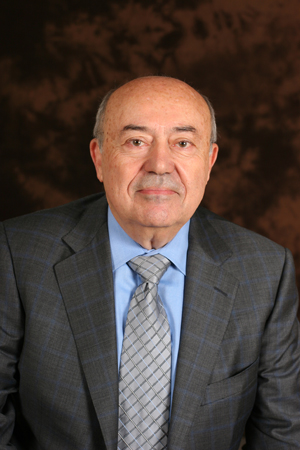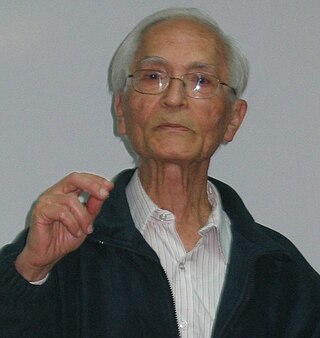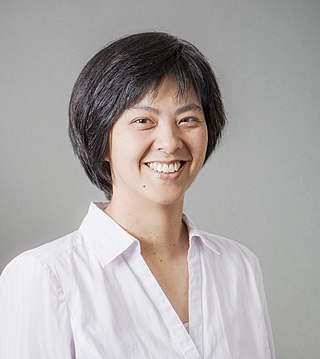Related Research Articles

Andrew James Viterbi is an Italian Jewish–American electrical engineer and businessman who co-founded Qualcomm Inc. and invented the Viterbi algorithm. He is the Presidential Chair Professor of Electrical Engineering at the University of Southern California's Viterbi School of Engineering, which was named in his honor in 2004 in recognition of his $52 million gift.

Jacob Ziv was an Israeli electrical engineer and information theorist who developed the LZ family of lossless data compression algorithms alongside Abraham Lempel.
Shang-Hua Teng is a Chinese-American computer scientist. He is the Seeley G. Mudd Professor of Computer Science and Mathematics at the University of Southern California. Previously, he was the chairman of the Computer Science Department at the Viterbi School of Engineering of the University of Southern California.

Yannis C. Yortsos is a Greek-American chemical engineer and academic, currently serving as Dean of the Viterbi School of Engineering at the University of Southern California.

William James Mitchell Jr. is an American video game player. He achieved fame throughout the 1980s and 1990s through claiming numerous records on classic video games, including a perfect score on Pac-Man. Twin Galaxies and Guinness World Records recognized Mitchell as the holder of several records on classic games, and he has appeared in several documentaries on competitive gaming and retrogaming. However, in 2017, the legitimacy of a number of his records was called into question, leading to Twin Galaxies stripping Mitchell of his records.
Maja Matarić is an American computer scientist, roboticist and AI researcher, and the Chan Soon-Shiong Distinguished Professor of Computer Science, Neuroscience, and Pediatrics at the University of Southern California. She is known for her work in human-robot interaction for socially assistive robotics, a new field she pioneered, which focuses on creating robots capable of providing personalized therapy and care that helps people help themselves, through social rather than physical interaction. Her work has focused on aiding special needs populations including the elderly, stroke patients, and children with autism, and has been deployed and evaluated in hospitals, therapy centers, schools, and homes. She is also known for her earlier work on robot learning from demonstration, swarm robotics, robot teams, and robot navigation.

Massoud Pedram is an Iranian American computer engineer noted for his research in green computing, energy storage systems, low-power electronics and design, electronic design automation and quantum computing. In the early 1990s, Pedram pioneered an approach to designing VLSI circuits that considered physical effects during logic synthesis. He named this approach layout-driven logic synthesis, which was subsequently called physical synthesis and incorporated into the standard EDA design flows. Pedram's early work on this subject became a significant prior art reference in a litigation between Synopsys Inc. and Magma Design Automation.
Chung-Chieh Jay Kuo is a Taiwanese electrical engineer and the director of the Multimedia Communications Lab as well as distinguished professor of electrical engineering and computer science at the University of Southern California. He is a specialist in multimedia signal processing, video coding, video quality assessment, machine learning and wireless communication.

Hao Li is a computer scientist, innovator, and entrepreneur from Germany, working in the fields of computer graphics and computer vision. He is co-founder and CEO of Pinscreen, Inc, as well as associate professor of computer vision at the Mohamed Bin Zayed University of Artificial Intelligence (MBZUAI). He was previously a Distinguished Fellow at the University of California, Berkeley, an associate professor of computer science at the University of Southern California, and former director of the Vision and Graphics Lab at the USC Institute for Creative Technologies. He was also a visiting professor at Weta Digital and a research lead at Industrial Light & Magic / Lucasfilm.

Shrikanth Narayanan is an Indian-American Professor at the University of Southern California. He is an interdisciplinary engineer–scientist with a focus on human-centered signal processing and machine intelligence with speech and spoken language processing at its core. A prolific award-winning researcher, educator, and inventor, with hundreds of publications and a number of acclaimed patents to his credit, he has pioneered several research areas including in computational speech science, speech and human language technologies, audio, music and multimedia engineering, human sensing and imaging technologies, emotions research and affective computing, behavioral signal processing, and computational media intelligence. His technical contributions cover a range of applications including in defense, security, health, education, media, and the arts. His contributions continue to impact numerous domains including in human health, national defense/intelligence, and the media arts including in using technologies that facilitate awareness and support of diversity and inclusion. His award-winning patents have contributed to the proliferation of speech technologies on the cloud and on mobile devices and in enabling novel emotion-aware artificial intelligence technologies.
Nenad Medvidović is a Professor of Computer Science and Informatics at the University of Southern California in Los Angeles, CA. He is a fellow of the IEEE and an ACM Distinguished Member. He was chair of ACM SIGSOFT and co-author of Software Architecture: Foundations, Theory, and Practice (2009). In 2008, he received the Most Influential Paper Award for a paper titled "Architecture-Based Runtime Software Evolution" published in the ACM/IEEE International Conference on Software Engineering 1998. In 2020, he received the Most Influential Paper Award for a paper titled "An architectural style for solving computationally intensive problems on large networks" published in the ACM/IEEE Software Engineering for Adaptive and Self-Managing Systems 2007. In 2017, he received an IEEE International Conference on Software Architecture Best Paper Award for his paper titled "Continuous Analysis of Collaborative Design".

Ellis Meng is the Shelly and Ofer Nemirovsky Chair of Convergent Biosciences and Professor of Biomedical Engineering and Electrical and Computer Engineering in the Viterbi School of Engineering at the University of Southern California, where she also serves as the Vice Dean of Technology Innovation and Entrepreneurship. Meng is highly decorated in the development of novel micro- and nanotechnologies for biomedical applications. In 2009, Meng was named on MIT Technology Review's "Innovators Under 35" List for her work on micropumps that deliver drugs preventing blindness, and she was listed on the 40 Under 40 List of the Medical Device and Diagnostic Industry (MDDI) in 2012.
Yolanda Gil is a Spanish computer scientist specializing in knowledge discovery and knowledge-based systems at the University of Southern California (USC). She served as chair of SIGAI the Association for Computing Machinery (ACM) Special Interest Group (SIG) on Artificial Intelligence, and the president of the Association for the Advancement of Artificial Intelligence (AAAI).
Emily Mower Provost is a professor of computer science at the University of Michigan. She directs the Computational Human-Centered Artificial Intelligence (CHAI) Laboratory.
Timothy M. Pinkston is an American computer engineer, researcher, educator and administrator whose work is focused in the area of computer architecture. He holds the George Pfleger Chair in Electrical and Computer Engineering and is a Professor of Electrical and Computer Engineering at University of Southern California (USC). He also serves in an administrative role as Vice Dean for Faculty Affairs at the USC Viterbi School of Engineering.
Prathima Agrawal is an Indian-American computer engineer known for her contributions to wireless networking, VLSI, and computer-aided design. She is a professor emerita and the former Samuel Ginn Distinguished Professor of Electrical and Computer Engineering at Auburn University.
Alice Cline Parker is an American electrical engineer. Her early research studied electronic design automation; later in her career, her interests shifted to neuromorphic engineering, biomimetic architecture for computer vision, analog circuits, carbon nanotube field-effect transistors, and nanotechnology. She is Dean's Professor of Electrical and Computer Engineering in the USC Viterbi School of Engineering of the University of Southern California.

Ewa Deelman is an American computer scientist specializing in distributed computing and cloud computing for applications in scientific computing. Her contributions include leading the design of the Pegasus scientific workflow management system, used by the LIGO scientific collaboration to detect gravitational waves from binary black holes. She is a research professor of computer science in the USC Viterbi School of Engineering, and a principal scientist at the Information Sciences Institute, both part of the University of Southern California.
Sujata Banerjee is a computer scientist specializing in the performance and quality of service of computer networks and data centers. Born in the UK, and educated in India and the US, she works in the US as vice president for research at VMware.
References
- 1 2 3 "USC - Viterbi School of Engineering - Viterbi Faculty Directory". viterbi.usc.edu. Retrieved April 14, 2021.
- ↑ "IEEE CS 2019 Fellows | IEEE Computer Society". February 15, 2019. Retrieved April 14, 2021.
- ↑ "2020 ACM Fellows Recognized for Work that Underpins Today's Computing Innovations". www.acm.org. Retrieved April 14, 2021.
- ↑ Bailey, Dustin (January 16, 2024). "After 5 years in court, Billy Mitchell's Donkey Kong and other arcade records are back thanks in part to a doctor's note that says nobody can prove he cheated". GamesRadar+. Retrieved February 18, 2024.
- ↑ Orland, Kyle (January 16, 2024). "After settlement, Billy Mitchell's scores go up on Twin Galaxies' "historic database"". Ars Technica. Retrieved February 19, 2024.